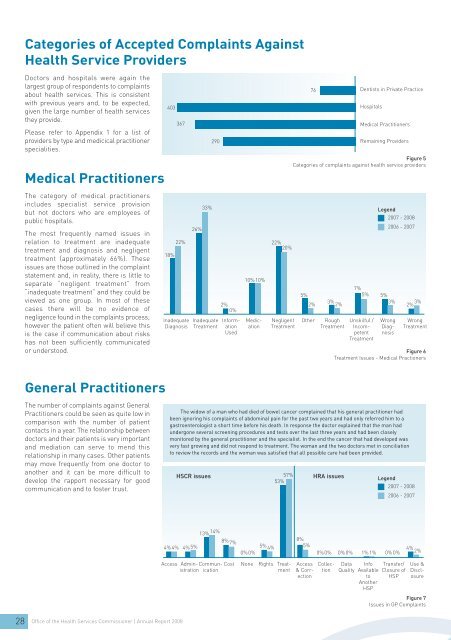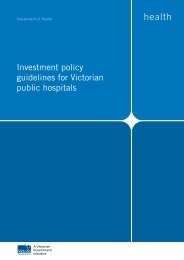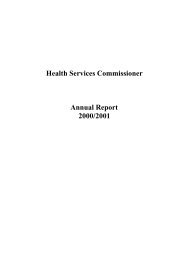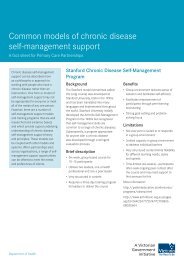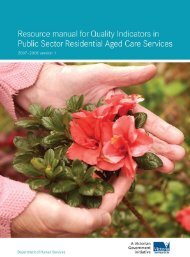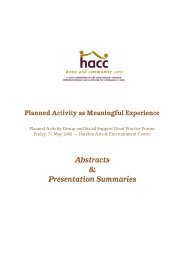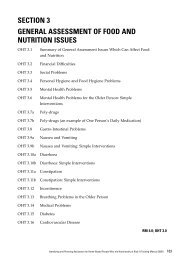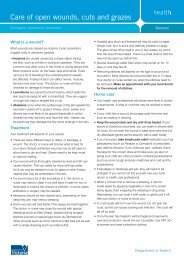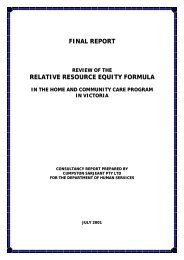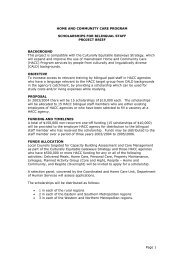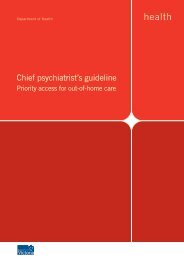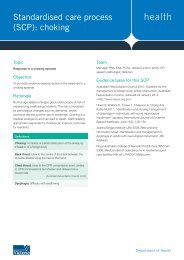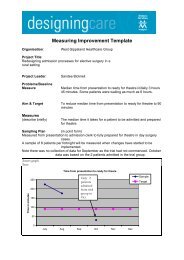Office of the Health Services Commissioner Annual Report 2008
Office of the Health Services Commissioner Annual Report 2008
Office of the Health Services Commissioner Annual Report 2008
You also want an ePaper? Increase the reach of your titles
YUMPU automatically turns print PDFs into web optimized ePapers that Google loves.
Categories <strong>of</strong> Accepted Complaints Against<br />
<strong>Health</strong> Service Providers<br />
Doctors and hospitals were again <strong>the</strong><br />
largest group <strong>of</strong> respondents to complaints<br />
about health services. This is consistent<br />
with previous years and, to be expected,<br />
given <strong>the</strong> large number <strong>of</strong> health services<br />
<strong>the</strong>y provide.<br />
Please refer to Appendix 1 for a list <strong>of</strong><br />
providers by type and medicical practitioner<br />
specialities.<br />
Medical Practitioners<br />
The category <strong>of</strong> medical practitioners<br />
includes specialist service provision<br />
but not doctors who are employees <strong>of</strong><br />
public hospitals.<br />
The most frequently named issues in<br />
relation to treatment are inadequate<br />
treatment and diagnosis and negligent<br />
treatment (approximately 66%). These<br />
issues are those outlined in <strong>the</strong> complaint<br />
statement and, in reality, <strong>the</strong>re is little to<br />
separate “negligent treatment” from<br />
“inadequate treatment” and <strong>the</strong>y could be<br />
viewed as one group. In most <strong>of</strong> <strong>the</strong>se<br />
cases <strong>the</strong>re will be no evidence <strong>of</strong><br />
negligence found in <strong>the</strong> complaints process;<br />
however <strong>the</strong> patient <strong>of</strong>ten will believe this<br />
is <strong>the</strong> case if communication about risks<br />
has not been sufficiently communicated<br />
or understood.<br />
403<br />
18%<br />
367<br />
22%<br />
Inadequate<br />
Diagnosis<br />
26%<br />
33%<br />
290<br />
Inadequate<br />
Treatment<br />
2%<br />
0%<br />
Medication<br />
Information<br />
Used<br />
10%10%<br />
Negligent<br />
Treatment<br />
76<br />
Dentists in Private Practice<br />
Hospitals<br />
Medical Practitioners<br />
Remaining Providers<br />
Figure 5<br />
Categories <strong>of</strong> complaints against health service providers<br />
22%<br />
20%<br />
5%<br />
2%<br />
O<strong>the</strong>r<br />
3% 2%<br />
7%<br />
5% 5%<br />
3%<br />
Rough<br />
Treatment<br />
Unskilful /<br />
Incompetent<br />
Treatment<br />
Legend<br />
2007 - <strong>2008</strong><br />
2006 - 2007<br />
Wrong<br />
Diagnosis<br />
2% 3%<br />
Wrong<br />
Treatment<br />
Figure 6<br />
Treatment Issues - Medical Practioners<br />
General Practitioners<br />
The number <strong>of</strong> complaints against General<br />
Practitioners could be seen as quite low in<br />
comparison with <strong>the</strong> number <strong>of</strong> patient<br />
contacts in a year. The relationship between<br />
doctors and <strong>the</strong>ir patients is very important<br />
and mediation can serve to mend this<br />
relationship in many cases. O<strong>the</strong>r patients<br />
may move frequently from one doctor to<br />
ano<strong>the</strong>r and it can be more difficult to<br />
develop <strong>the</strong> rapport necessary for good<br />
communication and to foster trust.<br />
The widow <strong>of</strong> a man who had died <strong>of</strong> bowel cancer complained that his general practitioner had<br />
been ignoring his complaints <strong>of</strong> abdominal pain for <strong>the</strong> past two years and had only referred him to a<br />
gastroenterologist a short time before his death. In response <strong>the</strong> doctor explained that <strong>the</strong> man had<br />
undergone several screening procedures and tests over <strong>the</strong> last three years and had been closely<br />
monitored by <strong>the</strong> general practitioner and <strong>the</strong> specialist. In <strong>the</strong> end <strong>the</strong> cancer that had developed was<br />
very fast growing and did not respond to treatment. The woman and <strong>the</strong> two doctors met in conciliation<br />
to review <strong>the</strong> records and <strong>the</strong> woman was satisfied that all possible care had been provided.<br />
HSCR issues<br />
57%<br />
4%4% 4%5%<br />
53%<br />
5% 4%<br />
HRA issues<br />
Legend<br />
2007 - <strong>2008</strong><br />
2006 - 2007<br />
13% 14% 8% 8%<br />
7%<br />
5%<br />
0%0% 0%0% 0%0% 1%1% 0%0% 4% 2%<br />
Access Administratioication<br />
Commun-<br />
Cost None Rights Treatment<br />
Access<br />
& Correction<br />
Collection<br />
Data<br />
Quality<br />
Info<br />
Available<br />
to<br />
Ano<strong>the</strong>r<br />
HSP<br />
Transfer/<br />
Closure <strong>of</strong><br />
HSP<br />
Use &<br />
Disclosure<br />
Figure 7<br />
Issues in GP Complaints<br />
28<br />
<strong>Office</strong> <strong>of</strong> <strong>the</strong> <strong>Health</strong> <strong>Services</strong> <strong>Commissioner</strong> | <strong>Annual</strong> <strong>Report</strong> <strong>2008</strong>


